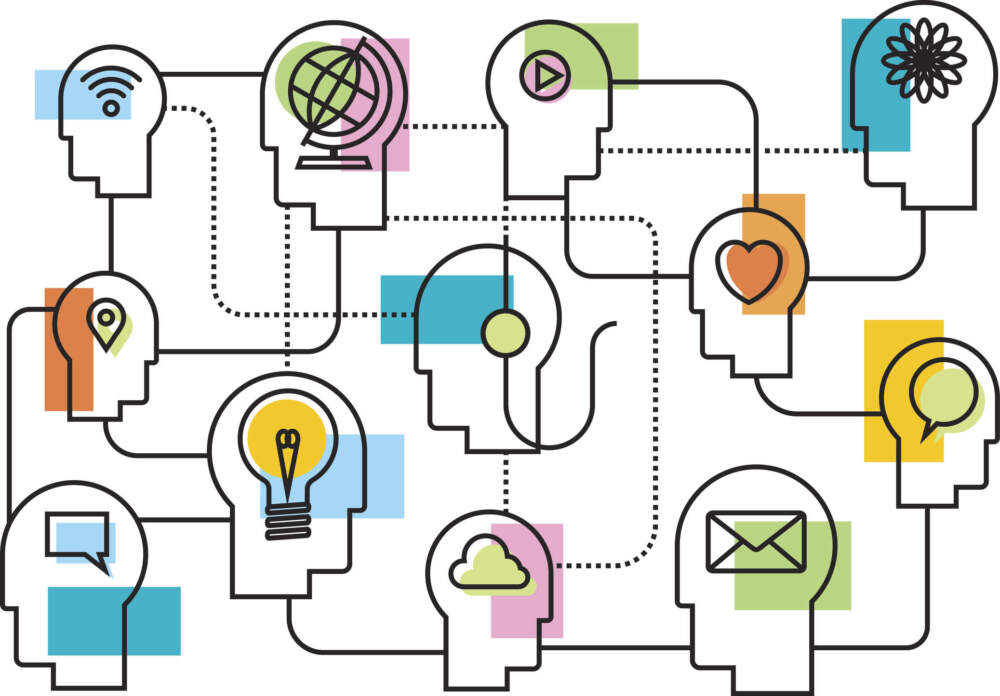Advertisement
Commentary
No, Alexa, don’t curate my news for me

We live in the age of algorithmic everything: Amazon suggests products I should buy based on those I’ve already purchased, Netflix tells me what to watch next, Apple Music named a whole radio station after me and helpfully filled it with my favorite indie rock songs from the early 2000s. The algorithm is everywhere, invisibly making choices for me throughout the day; but recently I’ve grown deeply suspicious of these unseen algorithmic overlords.
This is, in part, because I’m reading New Yorker writer Kyle Chayka’s new book “Filterworld: How Algorithms Flattened Culture,” in which he shines the light on algorithmic influence everywhere from digital apps to physical spaces. But it’s also because the algorithm has found me where it really never should: my bathroom. I’ll explain.
The first thing you need to know is that I’m an unabashed NPR super fan. I’ve been a devoted listener since college when I first heard a professor recall to a class something he’d heard on NPR, and I decided in that moment — as an aspiring college professor myself — that I’d better tune in. I locked WBUR into the number one preset on my car stereo, and there it has remained across several car stereos in the years since.
Like many millennials, I don’t have a radio at home, but since 2018, when I began making my house “smart” with an assortment of Amazon’s Alexa-enabled devices in various rooms, I listen to NPR at home too. I listen while making my kids’ school lunches, folding laundry and even while showering — the day’s news blaring from an Amazon Echo I installed in the bathroom for just this purpose.
The algorithm is everywhere, invisibly making choices for me throughout the day, but recently I’ve grown deeply suspicious of these unseen algorithmic overlords.
And it’s there that the algorithm crossed a line. As I step into the shower, I ask Alexa to play NPR and, within seconds, the national news headlines from the most recent hour begin to play, followed by local news. After the headlines, I’m treated to a playlist of recently aired stories and podcasts. But then, after about 15 or 20 minutes, maybe while I’m shaving or brushing my teeth, the news is interrupted by a pleasant and upbeat voice that asks, “Did we play something you didn’t want to hear?”
No, never, I think; but the voice continues anyway, “Simply say ‘Alexa, skip.’” This, the voice tells me, is just one of the ways I can control my news listening. Thanks for the tip, but here’s the thing: I don’t want to control my news listening. And, I don’t think anyone else should either. Of all the things that we’ve allowed the algorithm to manage — movies, music, and shopping, to name a few — news is a bridge too far.
It’s no coincidence that our on-demand, algorithmically filtered moment is also a moment of peak polarization. Of course, polarization has long plagued us, but the ability to literally filter our news and information exacerbates the problem, widening the gaps not only between what opinions people hold, but indeed what we think of as facts.
Advertisement
In “Filterworld,” Kyle Chayka’s main concern is the way that algorithmic filtering flattens culture. But his concerns extend to and, I’d argue, are amplified, when it comes to news. Regarding streaming music services like Spotify, Chayka writes, “The platform becomes a filter, and sometimes a barrier, for the listener’s relationship to the artist and their work.” Likewise, a platform like the NPR app—which invites users to mark stories as “Interesting”—risks becoming such a barrier as well. And that’s to say nothing of other more aggressively algorithmic news hubs like Google News or Apple News.
In both Google News and Apple News, for example, I’m presented with “thumbs up” and “thumbs down” buttons — ways I can tell the algorithm to suggest more or less of a similar type of story. Perhaps, Google starts serving me a lot of stories about Donald Trump’s latest exploits on the campaign trail and I decide I’d rather live in a blissfully Trump-free world (and who wouldn’t?). I can hit the “thumbs down” button every time I’m served such articles, and over time my news feed becomes Trumpless. Maybe I decide to stay home on Election Day because my filtered feed deceives me into thinking Biden’s got it in the bag. Maybe a lot of others do the same. While a Trumpless news cycle may sound like a fantasy, filtering him out of my news feed isn’t going to do me any favors. If Trump wins, all the “thumbs down” buttons in the world won’t be able to make him go away.
I don’t want to live in Filterworld.
So, no, I don’t want to control my news. I don’t want to live in Filterworld. When I open the NPR app, I don’t want to only hear stories that I’m already primed to enjoy, because hearing stories that stretch me beyond my interests and preconceived notions is one of the things I’ve always loved about listening. That is, the human editors with the expertise to select stories they deem important — the news I need to start my day — and the writers who report them fairly and accurately are all the filter I need. They’ve made the playlist, so to speak, and I don’t want to tweak it to suit my whims.
We can’t completely escape algorithmic everything, not really; we all live in Filterworld now. But as Chayka notes, we might be able to wrest free certain aspects of our experience. He writes, “the first step of escaping the algorithm’s grip is recognizing it,” and when we do so, we can move away from “the mindset of passive consumption” to create an alternative to Filterworld, in which “the influence of algorithms is neither inevitable nor permanent.”
Having recognized the algorithms’ grip, I choose to skip skipping, to continue in the trust I’ve placed in the reporters and editors at NPR to determine what is true, timely and essential for me to know each morning as I listen to the news, live, from my shower.
